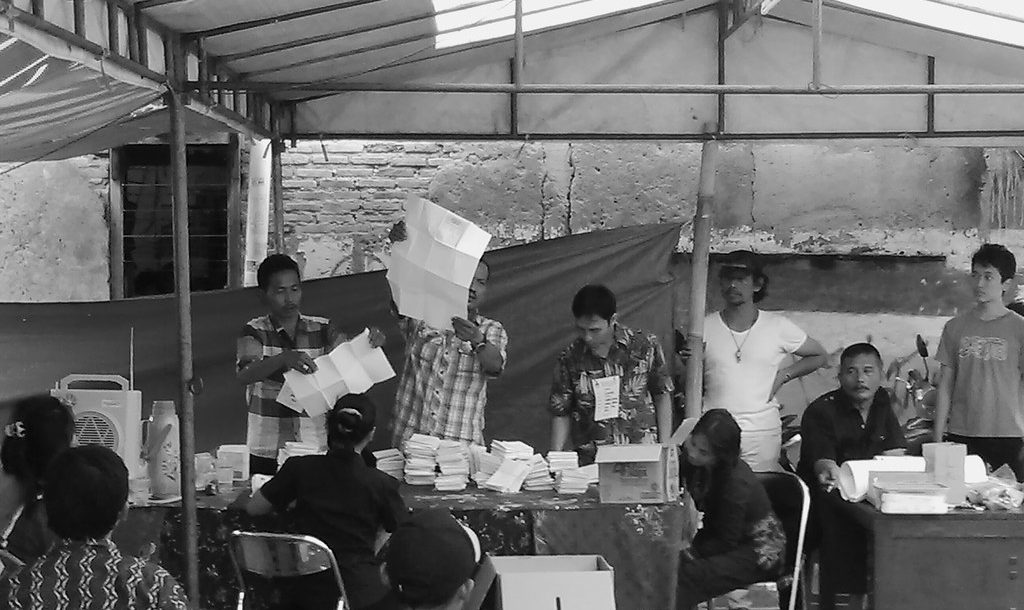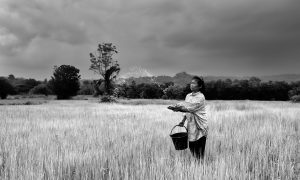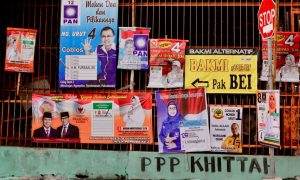Identity permeates the work of political science. It intertwines with political praxis and structures—the what that political scientists study—even as political scientists’ own identities colour their perceptions and shape their academic communities. However seemingly disparate, these dimensions intersect, amplifying the politics of doing political science. I do not pretend to offer a way around that thicket, but simply urge attention to blooms and thorns alike, the better to understand the interplay of assumptions, perspective, and commitments in the study of politics, particularly in and of Southeast Asia.
Identity and political institutions
Most fundamentally, the study of politics requires attention to identity. Transitions between authoritarianism and democracy, for instance, entail changes to political parties, civil liberties, and other institutional domains, but also revising how citizens understand their position within the regime, their expectations of politics, and how they pursue their own interests. This complexity mandates studying institutions in context, to see how rules-on-paper play out in a given political-cultural reality—and to understand whose wants and needs matter most to politicians and other policymakers, and who has full agency even to pursue those interests.
Formal structures only hint at questions of agency. It’s not just a matter of who has the vote, for example, but who feels empowered to vote their conscience, knowing they are immune to retribution or part of a privileged core that really can’t lose. Homing in on the interplay between institutions and identity—what the same structures represent to differently situated citizens—helps us better understand contemporary political problems.
The much remarked, much lamented recent populist upsurge in Asia and elsewhere, which current pandemic politicking only exacerbates, highlights this connection. For the Philippines’ Rodrigo Duterte, for instance, to capture the state entails reshaping institutions, on behalf of a different “we” than previously. The premise of Malaysia’s “Malay unity” Muafakat Nasional, antecedent to the new Perikatan Nasional government, or of Prabowo Subianto and his “212 movement” followers in Indonesia, likewise declares the state the due domain of one ethnoreligious community, and that community as threatened by a pluralist government. The right-populist message, in government or opposition, is specifically exclusive. Such a vision requires not according all citizens or residents full voice and agency, since not all with juridical rights are part of the normative “we the people”. (Alternatively, political leaders could seek to weave inclusive breadth into the socio-political fabric, to reify a different vision of the national “we”.) The contemporary populist dilemma demonstrates starkly the extent to which institutions look and function differently for different citizens.
That state institutions and ideologues favour or neglect some citizens is hardly novel or unique to Asia. But it is notable in the region given the preponderance of illiberal or decreasingly democratic regimes. Cultivating selective but strong support—whether of middle-class Chinese in Singapore or urban versus rural Thais in Thailand—may garner sufficient legitimacy to maintain uncoerced power. But the structures that institutionalize that stratification, from language policies, to welfare programs, to constituency delineation that discourages vote-pooling, to criteria for citizenship, leave both institutional and political-cultural legacies.
Understanding institutions’ functioning hence requires attention to who created those institutions, whose interests they serve or demote, and who might seek to reform or restructure them. That realization complicates our impetus to compare: it makes little sense, really, to extract the institution from its context, to see how a given set of, say, electoral rules plays out in one place versus another, without taking equally into account who crafted those rules, who might be motivated to change or maintain them, and how their playing out thus far has structured the identities currently populating the electoral landscape.
In short, the details matter. We need more than just countable metrics of performance and documented parameters of institutional form and function. Rather, to understand what goes right and wrong requires a more sociological or even anthropological sense of how institutions nest in their social context: how institutions actually interact with social cleavages they might intend to bridge, how segments of the community they structure understand and relate to those institutions, and why certain innovations just don’t “take” in a given context, or get pulled askew. And it matters for the enterprise, whether disciplinary gatekeepers take large-N data-crunchers or those who can purge proper nouns from their models as full-fledged political scientists and the rest of us as tolerated dilettantes, or whether scholars who study institutions in situ have full standing.
Identity and political science
Herein lies a critical parallel between the what and the who of political science: the identity of neither subject nor object is ever epiphenomenal or “neutral”. I myself study Southeast Asia as an outsider. I bring the panoply of pros and cons of an outside-Asia vantage point—a fairly instinctive yen for comparison, but also norms, expectations, and simple lacunae in what I know or really understand. And I bring the assumptions and predilections of the discipline in which I have been steeped. Having political science as my intellectual starting point shapes not just the questions I ask, but also the answers I am likely to see or find convincing.
That disciplinary orientation presents known foibles. I note just an indicative three. One is the normative slant that infuses so much research, colouring assessments of political regimes or strategies, notwithstanding perceptions or preferences on the ground.
Second, comparative politics has a whole-nation bias. It makes little sense to see most socio-political phenomena as being uniform nationwide. And yet we do, to an extent that American scholars of the US, for instance, would never presume of their own country.
And third, we have a tendency to focus on certain communities (perhaps simply the most accessible ones) or on questions that may not be of such priority domestically. Availability of grants, for instance, has encouraged scholarly hordes to probe political Islamism in Southeast Asia specifically in terms of potential for radicalization. But within Muslim-majority Malaysia, Indonesia, or Brunei, any number of other lenses are at least equally relevant—the bureaucratisation of Islamist authority, or implications of Islamist education or philanthropy for state social-service provision, or whether and when Islamist parties frame the political community differently from secular parties.
A caveat: many scholars who are themselves Asian share these biases, absorbed in the course of PhDs or otherwise. We learn disciplinary habits—they are not innate; where someone studied may matter about as much for their academic focus and starting point as where they are from. Plus, it’s easier to get published in a top-tier political science journal by following than bucking disciplinary convention.
Other problematic tendencies also cross regional lines. For instance, we see the propensity of anglophone scholars to cite mostly, and often only, works in English—compounded by professional pressures on scholars within the region, who function primarily in a national language, to publish in English and cite an English-language canon. It makes little intrinsic sense to privilege works by well-known “westerners” if the theories they invoke developed out of very different socio-political contexts, or their findings derive from insufficiently deep immersion on the ground. Southeast Asianists both within and outside the region could resist this habit, especially by branching out linguistically; obviously, not all high-quality academic work is in English. (The same sidelining holds true of work in other Asian and other languages. The overwhelming hegemony of English is hard to miss.)
So, having acknowledged these issues, what can one say about the praxis of political science in Asia—and especially the place of identity within our structuring institutions?
We might consider how dialogue emerges between “the discipline”, including political scientists as emissaries of disciplinary debates, and the region—here, embodied Southeast Asians. It remains the unfortunate case that those who define the “boundaries and … internal rules” of the discipline tend to be located in the global North. Those in the global South are to take the discipline as received, the ambit of its “intellectual walls” reflecting often as much the professional norms and intellectual trends of the US, Australia, or Europe as the accumulation of theoretical perspective. But it should not be that one simply takes theory to the region and fills in the blanks with local details.
Doing political science in Southeast Asia has changed my own sense of what matters most in how we understand political institutions, processes, and actors, and has made clear how identity shapes perspective on the region for “insiders” as well as for outsiders like me—since no one has a genuinely panoptic perspective on politics. Nor does the discipline look the same to all scholars. Nationalities, ethnicities, genders, sexualities, class backgrounds, academic pedigrees and employers … All affect how we experience political science as an institution. At least as important: our field sites are not exogenous to how we approach our scholarship. Working not just “on” but also in a region tests our assumptions and our identity vis-à-vis a global-North-centred disciplinary enterprise.
Moreover, real-world developments temper what political commitments motivate research on and in Asia. Tectonic world-systemic shifts restructure priorities and purposes, for analysts and audiences alike. Particularly in the US, Southeast Asian studies has something of a missing generation. The Vietnam War and resistance to it lured academic interest in the region in the 1960s and ’70s. By the 1980s, such interest had faded; the field lacked many new recruits. Interest ticked up again with the maturation of flocks of dragons and streaks of tigers by around the early 1990s, then especially after the Asian financial crisis of 1997 and the political dramas that followed—democratization in Indonesia, Myanmar, and (momentarily) Malaysia; authoritarian turns in Thailand and Cambodia; evolving opposition in Singapore; economic restructuring and political retrenchment in Vietnam and Laos. The study of politics—what brings us to the field, what captures our attention, with what assumptions we begin—is never apolitical.
For myself, I started my career just as the Cold War was ending, as US-dominated neoliberalism, then neoconservatism, gained purchase globally. My overarching goal has remained to explore interesting questions of agency, power, resistance, and transformation, amid these changes. My career path has required that I tip my hat toward disciplinary gatekeepers. Yet the audience that matters more—that can adjudicate whether these questions are the most important ones I might choose, whether my research is sound, and the extent of skew in my perspective—is within Southeast Asia. Southeast Asians, political scientists among them, are both subjects and objects of my research.
And for practicing academics, not just research, but also our teaching has a politics. How I communicate the what I study to my (mostly American) students, and how they come to situate themselves vis-à-vis Southeast Asia and the discipline, helps determine, for instance, the extent to which they comprehend this region as “other”. Do they see themselves as located within the same institutional tableau, confronting structurally similar identity and interest claims, or do they see Asia as a world apart? And how do they connect Asia as site of politics to political science as discipline as they encounter both?
The research and teaching of many Southeast Asia “area specialists” assumes a liminal status: often transdisciplinary and spanning global North and South. Many of us from the former incline heavily toward collaborations with colleagues in the region. Impetuses vary, from the imperatives of gaining informed input and access to sources, to initiatives to train early-career Southeast Asians better to fit within “mainstream” political science. However potentially straightjacketing, the latter efforts empower colleagues to bring new lenses to the discipline, the better to turn its tools to questions that matter to them.
The point is the difference between speaking for and speaking with: Southeast Asia (or any other region) as source of data (including for Southeast Asian scholars) versus font of questions. Collaboration is inherent to and embodied in academic conversation, but also builds common cause through intellectual work, even when not reflecting or inspired by left-political leanings (as has been common to work in and on Southeast Asia) or other ideological solidarity. Collaboration infuses the research enterprise, rendering research subjects also sounding-boards, critics, and sources of inspiration. Indeed, our roster of interlocutors may remain constant, but themselves migrate across structural positions, as politics transforms. Changes in Southeast Asia thus change the intellectual project and stakes for a critical scholarly enterprise driven by, in the words of my (Malaysian) colleague Sumit Mandal, “not cynicism so much as a knowledge of how things work”.
Ultimately, however veiled, scholarly rigor in this field is not just about tenure and promotion, but about political commitment and connections, as well. We can think of Edward Said’s notion of intellectuals, as “the ones to question patriotic nationalism, corporate thinking, and a sense of class, racial or gender privilege”. We might ask what sorts of Saidian intellectual communities we form, beyond friendship, when we push for a certain academic probity and grapple with common questions, from a position of engaged scholarship. Especially where political and academic institutional identities have been weak, as in much of Southeast Asia, these communities may offer ballast. And, building further on Said, who builds on Gramsci, we might identify dual intellectual functions for ourselves as academics, even those of us who are “outsiders”: as traditional intellectuals (the default frame for academic employment), but also as organic intellectuals, or those “actively involved in society” and invested in “chang[ing] minds”.
Said’s vision of the intellectual is an innately activist one, of bringing “universal principles” about human dignity and justice to bear in “rais[ing] embarrassing questions” and “confront[ing] orthodoxy and dogma”. Of course, much of our work as political scientists is really fairly mundane, or at least, less clearly intent on sticking it to The Man. But how many of us got our initial kick from causes that caught our hearts as much as our brains; how many never shed the naïve idea that political science can—even should!—be “political”; how many have supported, or have lost, friends and colleagues in or to the tumult of politics, in places where politics carries risk? Even when the research is more pedantic than provocative, it would be hard to research and write on Southeast Asia without seeing, and at least brushing up against, the further possibilities. Or to channel Said once more: as political scientists studying messy, mercurial politics, our intellectual function is that we do not merely articulate, but also represent and persuade. It’s actually rather hard to evade that role if we work with (or ourselves are) social scientists in the region or hope to have someone other than editors and journal reviewers read what we write.
Of course, we can be “relevant” in other ways, too: many of us feel the pull toward “impact” through policy engagement—work that brings academics into the embrace of government, policymakers, and business actors. A worthy endeavour, so long as we acknowledge the boundaries the need to be policy-relevant and practicable places on the questions we pursue and the answers we propose. But even so, better the powers-that-be listen to someone with actual on-the-ground expertise than someone working from disembodied theories and skewed assumptions.
The root of these questions of praxis relates again to the place of identity in the study of institutions, or of any politics. That identity is our own as researchers. We bring our own contextualized selves, infused by language study, friendships, affinity for the political climate of the place, the simple fact of spending significant time in “our countries”. The “deep and enduring attachments” we develop, Ben Anderson explains, “are often so much more valuable than lonely library research”, and “emotional and political leanings come into play” as we move from book-study to the field. This grounding fundamentally inflects the conceit of neutral objectivity as we examine institutions, ideas, and agency.
Tying these threads together: these questions of what one studies when one studies Asian politics, and what it means to be a student of Asian politics may seem discontinuous—to run on parallel tracks, at best. But our research questions are epiphenomenal to neither ourselves nor even our research sites. Just as politics infuses political science, political science helps to shape politics: not just scholars’, but also other actors’ sense of who has what agency, what about the institutional context warrants changing, and more.
Part of what makes the study of Southeast Asian politics in particular both exciting and daunting is that such scholarship may actually matter. “Intellectuals” (using the term, again, qua Said, as not requiring sneering elitism) are part of the political process—even those of us who come from elsewhere. Think of the porous border between academia and the policy and political worlds in Malaysia, or Indonesia, or the Philippines, including specifically of political scientists who become politicians and bureaucrats with significant voice and authority. But there’s also that element of collaboration—of a shared quest for knowledge and insight. Or recall how often foreign political scientists make it into the local press in Southeast Asia, their ideas taken seriously, whether lauded or lambasted. The scholarly identity as a political scientist in Southeast Asia includes a real possibility of influence, calling for self-reflexivity—recognizing how our gaze, normatively laden as it is, shapes the phenomena and organizations we study—but also making high-quality, ethical scholarship all the more imperative, when our scholarship is inherently “engaged”.
A Changing Malaysia?
A new series of perspectives on the “Malaysia Baharu” from Malaysian scholars, activists, and policymakers.
This role and mandate only strengthens when politics gets messy, or when a populist impulse shuns expertise. To be clear: I am not advocating some neo-colonial project of “fixing” Southeast Asian politics! But I am suggesting that serious social-scientific work in and on the region requires that we—whoever “we” political scientists may be—stop to think about where our questions come from, for whom we research and write, how we find common intellectual cause and pursue shared goals across national and institutional borders, and what impacts we might want our research to have, or recognize that it already has.
Adapted from a keynote address delivered at the Australian Political Science Association annual meeting in Adelaide, SA, 24 September 2019. Many thanks to the APSA for the invitation to speak, and to Sumit Mandal, Ed Aspinall, and Elly Kent in particular for their feedback on drafts.
 Facebook
Facebook  Twitter
Twitter  Soundcloud
Soundcloud  Youtube
Youtube  Rss
Rss 



